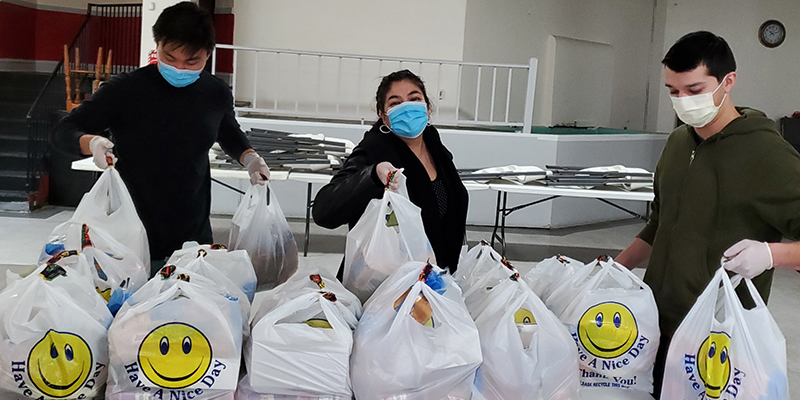
A box of food is just what the doctor ordered for patients at the UI Health Mile Square Health Center who may be suffering from COVID-19, the novel coronavirus.
Since many of the patients are isolated due to the pandemic, Mile Square’s South Shore clinic transformed the basement of nearby St. Luke’s Missionary Baptist Church (7262 S. Coles Ave., Chicago) into a food pantry to help feed the patients and their family members who may not be able to afford to eat because of health issues, lack of employment, scarcity of food at local supermarkets, or who may be fearful of distancing themselves from others.
Mile Square officials learned that many of its patients needed food while dental assistants conducted well-being checks and case management during telephone conversations. As a Federally Qualified Health Center (FQHC), Mile Square provides primary care services in underserved areas. Opened in 1967, Mile Square has 13 locations – including school-based clinics – in Chicago and the surrounding area, and in 2019 cared for more than 41,000 individuals, whether or not they could pay for it.
“We asked ourselves ‘How can our patients’ health improve if they don’t have food to nourish their body,’” said Sue Etminan, DMD, MPH, dental director at Mile Square’s South Shore Clinic (7037 S. Stony Island Ave., Chicago) who was instrumental in the pantry’s formation. “A food pantry was just another way we can help them get through this trying time in their lives.”
Blue Cross Blue Shield of Illinois stepped forward to assist with the pantry after the insurance company was contacted by Nicole Gastala, MD, assistant professor of family medicine at the University of Illinois College of Medicine and a member of the University of Illinois Cancer Center’s Cancer Prevention and Control program, and Mary Lynn Moody, Assistant Dean for Business Development in UIC’s College of Pharmacy. Additional colleges throughout the UIC campus who have experience in community outreach were also asked to lend a hand. The Office of Community Engagement and Neighborhood Health Partnerships (OCEAN-HP) was also heavily involved in the pantry’s creation, along with the Community Health Workers from Mile Square.
Patients insured by Blue Cross Blue Shield who live in four Illinois zip codes (60617, 60619, 60620 and 60649) that were determined to lack community resources and are experiencing high rates of COVID-19 are eligible to receive food at the pantry. Since the clinic has a high incidence of medically complex patients suffering from medical issues, including those surviving or having cancer, they are the first in line.
“We are also ensuring that those who get food delivery also get personal protective equipment such as masks,” said Karriem Watson, DHSc, MS, MPH, associate executive director of Mile Square and associate director of Community Outreach and Engagement at the University of Illinois Cancer Center.
The UI Cancer Center and Mile Square work closely together, not only to treat patients but to address cancer disparities in Chicago. Last year the Bristol-Myers Squibb Foundation awarded a three-year $1.5 million grant to the UI Cancer Center to develop population-specific cancer prevention and screening programs at community hospitals and health centers in South Shore (where the food pantry is located), Austin and Humboldt Park neighborhoods.
Open six days a week – Monday through Saturday – the food is either picked up at a pre-assigned time at St. Luke’s or delivered, both in a socially distant way. About 50 boxes of food a day has been delivered, and “we will continue to do so until as long as our patients need us to and as long as our resources allow,” Watson said.
Student volunteers pack enough perishable and non-perishable food – bread, peanut butter, pasta, pasta sauce and fresh produce – in boxes to last two to three days. Items may vary slightly due to food allergies and medical conditions. “We try to personalize the boxes as much as possible to ensure patients are receiving items they will use,” Etminan said.
Mile Square has received food donations from supermarket chain Mariano’s, and was given a stipend from Blue Cross Blue Shield to pay for the majority of the food; the clinic also has a contract with both Mariano’s and Jewel Osco. The box also contains ready-to-eat sandwiches made by Catering Out The Box, a Chicago food service company that is a vendor of UIC’s.
More than 50,000 coronavirus cases have been reported in Illinois, causing more than 2,000 deaths. Gastala, who has treated patients at Mile Square for the past two years, said discussions have yet to be held to determine whether the pantry will operate once the pandemic has slowed. But, she said, “If needed, I hope it will. We have been submitting grants and are waiting to hear back from potential funding organizations. This is something our patient population needs, and we want to support them any way we can.
